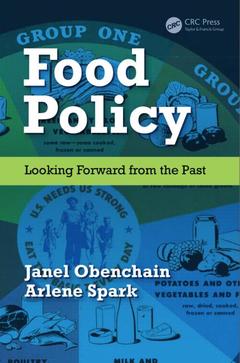Description
Food Policy
Looking Forward from the Past
Authors: Obenchain Janel, Spark Arlene
Language: English
Subjects for Food Policy:
Keywords
Dietary Guidance; Dietary Guidelines; food policy; Farm Bill; public health; FSMA; nutrition; Snap; sustainable agriculture; Federal Food Assistance Program; Snap Benefit; Food Assistance Program; Federal Food Assistance; Market Nutrition Program; Dietary Goals; Specialty Crop; Food System; GRAS Substance; EQIP; NHANES Data; Great Depression; Food Waste; WIC Participant; GRAIN PRODUCTION; TFP; Crop Insurance; Food Policy Councils; NSLP; Health Claims
· 15.6x23.4 cm · Hardback
Description
/li>Contents
/li>Readership
/li>Biography
/li>
Access to safe, adequate, and nutritionally balanced food is a cornerstone of public health. Food Policy: Looking Forward from the Past examines the influences of grassroots movements, the government, and industry on the US food systems. The authors explore the intersection of food and nutrition and how policy influences this overlap. They illuminate how current food policies stem from choices made (or abandoned) along the way. Sprinkled throughout the book are challenging questions meant to evoke critical analysis and inspire further, in-depth exploration.
Although the book focuses mainly on policy, it provides enough detailed nutrition information to put the policy discussion in historical context. It examines the emergence of trends, food policies, and legislation balancing issues of food, nutrition and diet-related conditions, such as obesity. It also covers food markets, sustainable agriculture, dietary guidelines and dietary allowances, food labeling, food safety, and school wellness. The book details the nuances of policy discussions and the struggles of the FDA in regulating fortification, food additives, and the development of daily values for nutrients. It also examines themes of government action versus individual liberty.
With balanced coverage of nutrition and policy issues, the book illustrates how the past gave rise to the present. It poses many questions, not the least of which is: Do we have the right to know how our food is produced? The balanced coverage of nutrition and policy issues in this book gives you the foundation to critically explore the influence of food policy on public health.
Introduction. Politics: US Food Policy I. US Food Policy II. Food Activism I. Food Activism II. Enrichment and Fortification I. Enrichment and Fortification II. Dietary Guidance I. Dietary Guidance II. An Irreverent Look at the Four Food Groups: Milk. Meat, Fish, Poultry. Grains. Fruits and Vegetables. Federal Food Assistance and Food Security. Legislation and Economics: Food Policy in Correctional Facilities. Taxation, Zoning, and Other Ordinances. Baby Friendly Hospitals. Food Safety.
Janel Obenchain majored in philosophy at Northwestern University. If she had been smarter at the time she would have continued on to a PhD in philosophy. Pragmatically, she thought law school might afford better employment opportunities. And it would have, too, if she had gone to law school. Fortunately, she was waitlisted and then rejected by Stanford, as this allowed her to instead participate in a far riskier lifestyle of attempting to qualify for the 1996 Olympic team in women’s epee and working in numerous dot.com startups in the San Francisco Bay Area. Unfortunately she never made it to the top of either of these two pyramid schemes.
The details between then and her arrival at the public health program at Hunter College, City University of New York are not worth repeating. While residing in New York she studied community nutrition, including that of her own neighborhood. She worked for United Way NYC as a site evaluation consultant for food pantries and soup kitchens and, with a team of professors that included Dr. Spark, developed a policy agenda for the New York City Food and Fitness Partnership. Ms. Obenchain is the co-author of Food Policy: Looking Forward From the Past (2015).
Arlene Spark attended the City College of New York (CCNY) and Columbia University Teachers College. After majoring in English at CCNY, she worked for a year as a narcotics caseworker for the New York City Department of Social Services and then for three years as a home economics teacher at the Narcotics Addiction Control Commission (NAAC). The Commission awarded her a paid educational leave of absence for an MS in Public Health Nutrition. She subsequently earned an EdM in community nutrition and started teaching on the college level--and has been teaching on the college level ever since. A United States Public Health Traineeship allowed her to return to school to complete a doctorate in nutrition education. Dr. Spark’s caree




